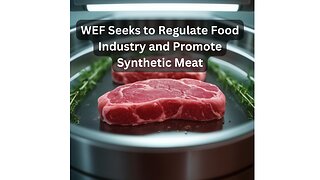12 Countries and the U.S. Agree to Policy That Could Starve the Planet!
The United States and 12 other countries have recently signed an agreement that poses a significant threat to global agriculture, potentially leading to widespread famine and starvation. The countries involved include:
Argentina, Australia, Brazil, Burkina Faso, Chile, Czech Republic, Ecuador, Germany, Panama, Peru, Spain, Uruguay
The potential loss of meat production from key nations like Australia, Brazil, and the U.S. could result in severe hunger for countless people, compounded by the broader impact on other foodstuffs produced in these countries.
Citing "climate change" and "global warming" as the rationale behind these drastic measures, proponents argue that agriculture, particularly livestock farming, must cease to prevent animal emissions from contributing to environmental warming.
"I am pleased to see the shared commitment of the international community to reduce methane emissions from agriculture as part of our obligations under the Paris Agreement on climate change," stated Luis Planas, Spain's Minister of Agriculture, Fisheries, and Food.
Marcelo Mena, CEO of the Global Methane Hub, echoed this sentiment, emphasizing, "Food systems are responsible for 60 percent of methane emissions."
(Related: Did you know that Europe recently conducted a simulation of food crisis scenarios to address issues now deliberately engineered by globalists?)
The narrative continues to evolve, with claims that food production itself is a major environmental problem. Some argue that global society must revert to a hunter-gatherer lifestyle, with a vastly reduced human population, to facilitate planetary cooling and a return to "normalcy."
"Reducing methane emissions is the quickest method to achieve short-term cooling," asserted former presidential candidate John Kerry, a prominent advocate for climate change initiatives. He also noted that improving farmer productivity and resilience could help pave the way for a low-methane future in food and agriculture.
Part of the Global Methane Pledge involves transitioning from traditional foods like beef and poultry to alternatives such as crickets and insect larvae, which are considered both unpalatable and nutritionally inadequate for human consumption.
With ongoing inflationary trends bordering on hyperinflation, we are approaching a point where meat and food, in general, may become prohibitively expensive for average consumers, potentially forcing a shift towards insect-based diets.
Journalist Leo Hohmann noted, "It is reasonable to presume from this language that the measures being contemplated include the replacement of substantial portions of cattle used for beef and dairy, pork, and chicken with insect larvae, mealworms, crickets, etc."
"The U.N., World Economic Forum, and various NGOs have long advocated for meatless diets and the consumption of insect protein. Billionaires have invested in massive insect processing facilities in Illinois, Canada, and the Netherlands, where mealworms, crickets, and other insects will be processed as food additives, often without clear labeling to inform consumers of their contents."
Should we be surprised that our leaders are endorsing actions that could endanger lives by sabotaging the food supply?
-
 2:56
2:56
Conspiracy Chronicle
1 month agoRevealed: WEF’s Push for Fake Meat to Control Your and What You Eat
219 -
 14:58
14:58
ADAPT2030
1 month ago $2.37 earnedReasons More Food Will Disappear Globally
2.18K8 -
 30:43
30:43
ADAPT2030
1 month ago $1.61 earnedA Cover For Global Crop Losses
2.08K3 -
 1:38:14
1:38:14
North American Ag Spotlight
27 days agoHow Will Climate Change Affect Agriculture?
91 -
 46:29
46:29
Health Ranger Report
28 days agoBBN, June 11, 2024 - Part 1 - States begin BLOCKING WATER to the farms that feed America...
14.7K48 -
 42:02
42:02
Nova Scotia Free Speech Bulletin Podcast
1 month agoUnited Nations is a death machine, all countries must leave the UN
8218 -
 33:07
33:07
Clarity from Chaos
1 month agoConvenient Warming: One on one with C02 director and author Gregory Wrightstone
461 -
 22:16
22:16
Health Ranger Report
1 month agoNOT FULLY HUMAN: The power-hungry globalist colonizers...
9.27K44 -
 1:07:28
1:07:28
heartlandinstitute
1 month agoClimate Alarmism Undermines The Future - In The Tank #451
1551 -
 1:09:48
1:09:48
The Official Corbett Report Rumble Channel
22 days agoRegenerative Agriculture - #SolutionsWatch
6K22